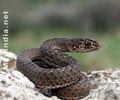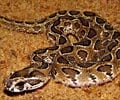Snake venom is poisonous, a new way that can neutralize the deadly snake venom in a cheap and effective way was discovered, reveals study.

- Snake venom is a highly modified saliva that contains proteins, polypeptides and other toxic materials.
- Existing treatment for snake bite requires slow intravenous infusion in a hospital and is found to be expensive.
- The newly synthesized nanomaterial may easily halt the spread of snake venom.
The number of deaths due to snake bites are rare in the United States, it is only around 5 every year. However, the new treatment can be useful for dog owners, bikers and enthusiasts against nature at the ankle level.
The existing treatment of antidote may halt the damage caused by the snake bite and requires slow intravenous infusion at a hospital and may cost around $100,000.
Jeffrey O’Brien, lead author of the study, said, "Current anti-venom is very specific to certain snake types. Ours seems to show broad-spectrum ability to stop cell destruction across species on many continents, and that is quite a big deal."
The research study was published in the Journal of the American Chemical Society.
O’Brien, found that some type of anti-venom property was expected as the human serum samples in the test tube stayed clear without turning scarlet due to the rupture of red blood cells by the venom.
Nanodote compound has a long shelf life and is cost-effective when compared to the existing antidote which is made by injecting the horses with venom and waiting for several weeks to develop antibodies. This is then extracted in their blood and shipped from Mexico or Australia to other places that can afford. This process is not allowed in the U.S. and major suppliers have discontinued shipments to many markets.
O’Brien, said, "Our treatment costs pennies on the dollar and, unlike the current one, requires no refrigeration."
"It feels pretty great to think this could save lives."
These findings also discover that scorpion and spider bite infections can be slowed or stopped through this invention. Patents are pending and make seek public and private funding to move forward with clinical trials and product development.
The research team has also pioneered a synthetic antidote for bee meliteen which is present in stings and can also kill people who have allergic reactions.
"The goal is not to save mice from venom and bee stings," Shea said. "But to demonstrate a paradigm shift in thinking about solutions to these types of problems. We have more work to do, and this is why we're seeking a fairly significant infusion of resources."
The first phase of the laboratory work was funded by The U.S. Department of Defense's research arm. The author concluded that the innovative medic in the backpack may help soldiers and military who are bit by toxic snakes to delay the spread of the venom.
Interesting Facts on Snake Bite
- Around 270 species of snakes are found in India, and only few of them are venomous.
- Snake bite can be deadly if not treated at an earlier stage.
- Cobra, copperhead, coral snake, cottonmouth and rattlesnakes are some of the snakes with venomous bites.
- Snake bites may cause wound bleeding, blurred vision, burning skin, convulsions, diarrhea and dizziness.
Source-Medindia










